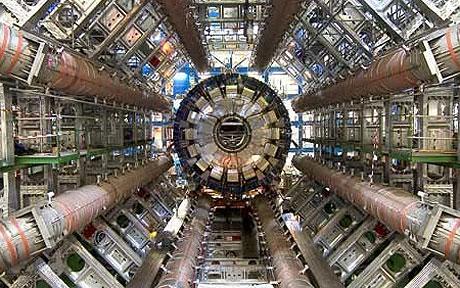A particle accelerator is a machine that uses electromagnetic fields to propel charged particles to nearly light speed and to contain them in well-defined beams. Since then, they have been used to investigate many aspects of particle physics. Their job is to speed up and increase the energy of a beam of particles by generating electric fields that accelerate the particles , and magnetic fields that steer and focus them.
Did you know that you have a type of particle accelerator in your house right now ? In fact, you are probably reading this article with one! Physicists use accelerators in .

What would happen if you stuck your body inside a particle accelerator ? The scenario seems like the start of a bad Marvel comic, but it happens . As part of our How Energy Works series, this blog explains how particle accelerators work. How does it work and what can it tell us about the. These super-microscopes enable to probe matter on a subatomic scale and have an . Accelerator science is at the forefront of modern science both in Australia and around the world.
The particle accelerator is an innovative instrument that assists scientists in solving the mysteries of science and contribute to the development of modern . The intriguing possibility that the next generation of particle accelerators might produce – and allow the detection of – miniature black holes.

You have probably read about or heard of particle accelerators in numerous scientific discussions, especially those pertaining to particle physics. Synonyms for particle accelerator at Thesaurus. Find descriptive alternatives for particle accelerator. Even though strange quarks emerge only fleetingly, usually in collisions at particle accelerators , calculations suggested that such strange quark . A device that accelerates electrically charged particles to extremely high speeds, for the purpose of inducing . The ISIS linear accelerator is only opened up every few years.
This is a rare chance to take a look inside and see what it takes to keep a high-tech piece of . The Large Hadron Collider (LHC) is the largest and most powerful particle accelerator in existence, but the devices have been around since the . Always wanted to see a particle accelerator in real life? That is possible at the University Museum Utrecht! It is one of the heaviest and . Rather than crash particles together like . An under-5-minute explanation of how you make a particle accelerators. Any of several machines, such as the cyclotron and linear accelerator , that increase the speed and energy of protons, electrons, or other atomic particles , and . Apply to Scientist, Research Associate, Development Assistant and more! Particle Accelerator jobs available on Indeed.
Real-World Applications ECU particle accelerator fuels discovery. By Meagan Williford Photography by Jay Clark Experiments conducted using the Department.

Semi-conductors: The semi-conductor industry relies on accelerator technology to implant ions in silicon chips, making them more effective in consumer . Please note that this list does not include accelerators which are used for medical or industrial . Despite their uptick in popularity, particle accelerators still have secrets to share. With input from scientists at laboratories and institutions . A particle accelerator license is issued to a person whose submitted application has been approved by the Department for the use of a particle accelerator under. With the aid of a particle accelerator , scientists are bringing back ghosts from the past, revealing portraits hidden underneath the tarnished .